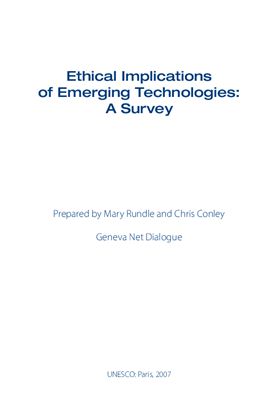Mary Rundle and Chris Conley. Ethical Implications of Emerging
Technologies: A Survey
Geneva Net Dialogue
UNESCO: Paris, 2007
Embracing coherent ethical guidelines is essential for building inclusive knowledge societies and raising awareness about the ethical aspectsand principles is central for upholding the fundamental values of freedom, equality, solidarity, tolerance and shared responsibility. Thus, UNESCO encourages the defi nition and adoption of best practices and voluntary, professional guidelines addressing ethical issues for media professionals, information producers, and service providers and users with due respect to freedom of expression
The quickening speed of technological evolution leaves little time to decision-makers, legislators and other major stakeholders to anticipate and absorb changes before being challenged to adapt to the next wave of transformation. Lacking the time for lengthy refl ection, the inteational community is often faced with immediate policy choices that carry serious moral and ethical consequences.
Increase public infrastructure or permit preferential use by investors? Allow the market to oblige people to participate in digital systems or subsidize more traditional lifestyles? Let technology develop as it will or attempt to programme machines to safeguard human rights? The Infoethics Survey of Emerging Technologies prepared by the NGO Geneva Net Dialogue at the request of UNESCO aims at providing an outlook to the ethical implications of future communication and information technologies. The report further aims at alerting UNESCO’s Member States and partners to the increasing power and presence of emerging technologies and draws attention to their potential to affect the exercise of basic human rights. Perhaps as its most salient deduction, the study signals that these days all decision makers, developers, the corporate scholar and users are entrusted with a profound responsibility with respect to technological developments and their impact on the future orientation of knowledge societies. It is our hope that this study will impress upon the policy makers, community, producers and users the need to carefully observe evolutions in ICTs– and, by so doing, to comprehend the ethical and moral consequences of technological choices on human rights in the Knowledge Societies.
Geneva Net Dialogue
UNESCO: Paris, 2007
Embracing coherent ethical guidelines is essential for building inclusive knowledge societies and raising awareness about the ethical aspectsand principles is central for upholding the fundamental values of freedom, equality, solidarity, tolerance and shared responsibility. Thus, UNESCO encourages the defi nition and adoption of best practices and voluntary, professional guidelines addressing ethical issues for media professionals, information producers, and service providers and users with due respect to freedom of expression
The quickening speed of technological evolution leaves little time to decision-makers, legislators and other major stakeholders to anticipate and absorb changes before being challenged to adapt to the next wave of transformation. Lacking the time for lengthy refl ection, the inteational community is often faced with immediate policy choices that carry serious moral and ethical consequences.
Increase public infrastructure or permit preferential use by investors? Allow the market to oblige people to participate in digital systems or subsidize more traditional lifestyles? Let technology develop as it will or attempt to programme machines to safeguard human rights? The Infoethics Survey of Emerging Technologies prepared by the NGO Geneva Net Dialogue at the request of UNESCO aims at providing an outlook to the ethical implications of future communication and information technologies. The report further aims at alerting UNESCO’s Member States and partners to the increasing power and presence of emerging technologies and draws attention to their potential to affect the exercise of basic human rights. Perhaps as its most salient deduction, the study signals that these days all decision makers, developers, the corporate scholar and users are entrusted with a profound responsibility with respect to technological developments and their impact on the future orientation of knowledge societies. It is our hope that this study will impress upon the policy makers, community, producers and users the need to carefully observe evolutions in ICTs– and, by so doing, to comprehend the ethical and moral consequences of technological choices on human rights in the Knowledge Societies.

